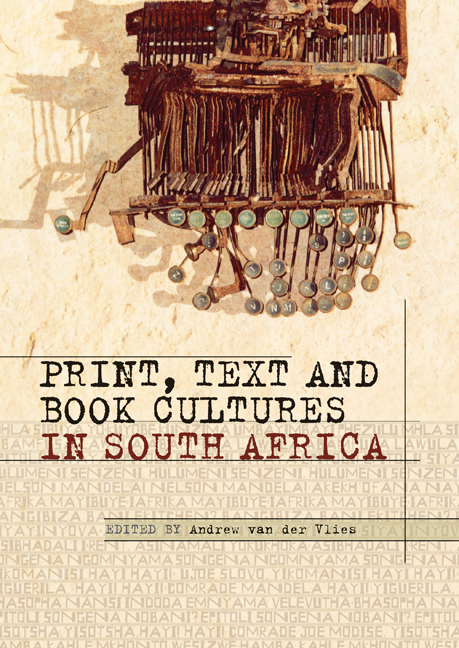Book contents
- Frontmatter
- Contents
- Acknowledgements
- Abbreviations and acronyms
- 1 Introductory
- 2 Print Cultures and Colonial Public Spheres
- 2.1 Metonymies of Lead: Bullets, Type and Print Culture in South African Missionary Colonialism
- 2.2 “Spread Far and Wide over the Surface of the Earth”: Evangelical Reading Formations and the Rise of a Transnational Public Sphere: The Case of the Cape Town Ladies’ Bible Association
- 2.3 Textual Circuits and Intimate Relations: A Community of Letters across the Indian Ocean
- 3 Local/Global: South African Writing and Global Imaginaries
- 4 Three Ways of Looking at Coetzee
- 5 Questions of the Archive and the Uses of Books
- 6 Orature, Image, Text
- 7 Ideological Exigencies and the Fates of Books
- 8 New Directions
- Contributors
- Index
2.2 “Spread Far and Wide over the Surface of the Earth”: Evangelical Reading Formations and the Rise of a Transnational Public Sphere: The Case of the Cape Town Ladies’ Bible Association
from 2 - Print Cultures and Colonial Public Spheres
Published online by Cambridge University Press: 21 April 2018
- Frontmatter
- Contents
- Acknowledgements
- Abbreviations and acronyms
- 1 Introductory
- 2 Print Cultures and Colonial Public Spheres
- 2.1 Metonymies of Lead: Bullets, Type and Print Culture in South African Missionary Colonialism
- 2.2 “Spread Far and Wide over the Surface of the Earth”: Evangelical Reading Formations and the Rise of a Transnational Public Sphere: The Case of the Cape Town Ladies’ Bible Association
- 2.3 Textual Circuits and Intimate Relations: A Community of Letters across the Indian Ocean
- 3 Local/Global: South African Writing and Global Imaginaries
- 4 Three Ways of Looking at Coetzee
- 5 Questions of the Archive and the Uses of Books
- 6 Orature, Image, Text
- 7 Ideological Exigencies and the Fates of Books
- 8 New Directions
- Contributors
- Index
Summary
The field of book history as a distinct enterprise has only recently started to take root in South Africa. As such, it is necessarily a late entrant into a field that elsewhere has been taking shape for several decades. While this belated entry poses problems, it equally presents opportunities. Like most endeavours in the humanities, book history, since its inception, has been largely national in orientation (the book in France, the book in Australia and so on). However, this national emphasis has increasingly given way to more transnational approaches, and like most disciplines, book history faces a post-nationalist intellectual climate. South African interest in book history consequently emerges at a time when “mainstream” research must of necessity reinvent itself. One useful direction, then, for South African book history to take is to conceptualise itself as transnational. In this way, local book history will be able to enter a productive dialogue with “mainstream” scholarship and will be able to formulate paradigms that illuminate both the uniqueness of South African developments and the ways in which these can be factored into a broader international story.
This essay attempts to explore these propositions in relation to what may at first appear to be a modest case study—that of the Cape Town Ladies’ Bible Association (CTLBA). However, this organisation has been chosen as it forms part of a much larger transnational landscape, namely that of nineteenthcentury Protestant evangelical reading and publishing. As others have pointed out, within the expanding world of European nineteenth-century book production, Christian religious material comprised the overwhelming proportion of what was produced (Bayly 2004, 357; Howsam 1991). However, the meaning of this fact has seldom been grasped, since studies of nineteenthcentury book production tend to follow two separate analytical channels, the one concerned with religious publishing, the other with secular enterprises. The two arms—secular and religious—are often treated discretely, the former the domain of historians of the book and publishing (Feather 1988), the latter the domain of scholarship on nineteenth-century Christianity, missions and philanthropy (Raven 2000; Maughan 1996).
- Type
- Chapter
- Information
- Print, Text and Book Cultures in South Africa , pp. 74 - 86Publisher: Wits University PressPrint publication year: 2012



